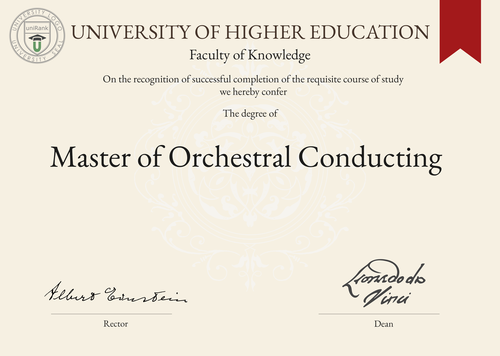
Master of Orchestral Conducting (MOC)
Guide to Master of Orchestral Conducting Program/Course/Degree
Master of Orchestral Conducting (MOC)

Program Name
Master of Orchestral ConductingProgram or Degree abbreviation
MOCDuration range
The duration of a Master of Orchestral Conducting program can vary depending on the country and university. Typically, it ranges from 1 to 3 years.Tuition range
The tuition fees for a Master of Orchestral Conducting program can vary significantly based on the country and university. The range can be anywhere from $10,000 to $50,000 per year.Overview
A Master of Orchestral Conducting program is designed to provide advanced training and education to aspiring orchestral conductors. It focuses on developing the necessary skills, knowledge and techniques required to lead and conduct orchestras effectively.Curriculum Overview by year
The curriculum of a Master of Orchestral Conducting program is typically divided into different years or semesters. The specific courses and requirements may vary, but a general overview is as follows: Year 1: - Music Theory and Analysis - Orchestral Score Reading - Conducting Techniques - Music History - Ensemble Conducting Year 2: - Advanced Conducting Techniques - Orchestral Repertoire - Opera Conducting - Chamber Music Conducting - Elective Courses Year 3: - Orchestral Rehearsal and Performance - Final Conducting Project - Research and ThesisKey Components
The key components of a Master of Orchestral Conducting program include: - Intensive training in conducting techniques - Score reading and analysis - Rehearsal and performance experience with orchestras - Study of orchestral repertoire and conducting styles - Opportunities to conduct various ensembles and chamber groups - Music theory and history educationCareer Prospects
Graduates of a Master of Orchestral Conducting program can pursue various career paths in the field of conducting. Some potential career prospects include: - Orchestral conductor - Opera conductor - Music director - Guest conductor - Music educator - Artistic directorSalary Expectations
The salary expectations for orchestral conductors can vary greatly depending on factors such as experience, reputation, location and the size of the orchestra. On average, orchestral conductors can earn anywhere from $30,000 to $150,000 per year. For a more accurate understanding of salary expectations, you can utilize the Job Sites Search Engine, from our sister site jobRank, which searches over 4,600 job sites worldwide. Make sure to specify not only the job title but also the country you are interested in.Conclusions:
It is important to note that the duration, tuition fees, curriculum, key components, career prospects and salary expectations of a Master of Orchestral Conducting program can vary depending on the chosen country or location of study, as well as the specific university offering the program. Prospective students are advised to research and compare different programs and universities to find the best fit for their goals and aspirations. For those interested in pursuing a Master of Orchestral Conducting degree, the uniRank World Universities Search Engine can be a valuable resource. It allows visitors to search for universities offering this specific degree anywhere in the world, providing a comprehensive list of options to explore.World Universities Search Engine
search for Master of Orchestral Conducting (MOC) and add the Location (country, state etc.) or specific University you are interested in studying at.
Query examples:
- Master of Orchestral Conducting (MOC) United States
- Master of Orchestral Conducting (MOC) United Kingdom online
- Master of Orchestral Conducting (MOC) Australia international students
- Master of Orchestral Conducting (MOC) University of California
- Master of Orchestral Conducting (MOC) University of London tuition fees
- Master of Orchestral Conducting (MOC) University of Sydney scholarships
Share Program/Course
Interesting? Share this program/course/degree info with your friends now.